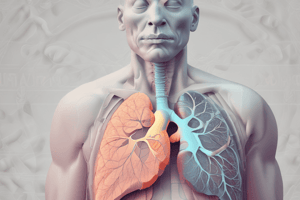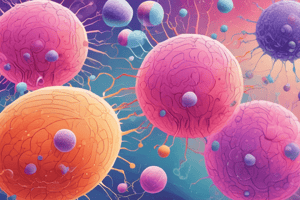Podcast
Questions and Answers
What is the most common type of cancer in males?
What is the most common type of cancer in males?
- Colorectal cancer
- Breast cancer
- Cervical cancer
- Lung cancer (correct)
Which type of cancer is caused by prolonged exposure to asbestos?
Which type of cancer is caused by prolonged exposure to asbestos?
- Cervical cancer
- Lung cancer
- Breast cancer
- Mesothelioma (correct)
Which of the following is NOT a treatment option for cancer?
Which of the following is NOT a treatment option for cancer?
- Surgery
- Chemotherapy
- Antibiotics (correct)
- Radiation therapy
What is the primary method of treatment for most isolated, solid cancers?
What is the primary method of treatment for most isolated, solid cancers?
What is the chance of survival dependent on?
What is the chance of survival dependent on?
Which type of cancer is present in about 3% of people with colorectal cancer?
Which type of cancer is present in about 3% of people with colorectal cancer?
What is the most common type of cancer in females?
What is the most common type of cancer in females?
What is the term for the spread of cancer to other locations in the body?
What is the term for the spread of cancer to other locations in the body?
Which of the following is NOT a sign or symptom of cancer?
Which of the following is NOT a sign or symptom of cancer?
Flashcards
What is cancer?
What is cancer?
A group of diseases characterized by abnormal cell growth with the potential to invade or spread to other parts of the body.
What is metastasis?
What is metastasis?
The spread of cancer cells from the original tumor to other parts of the body.
What is a carcinogen?
What is a carcinogen?
A substance or agent that can cause cancer.
What is radiation therapy?
What is radiation therapy?
Signup and view all the flashcards
What is chemotherapy?
What is chemotherapy?
Signup and view all the flashcards
What is metastatic cancer?
What is metastatic cancer?
Signup and view all the flashcards
What is biopsy?
What is biopsy?
Signup and view all the flashcards
What is palliative care?
What is palliative care?
Signup and view all the flashcards
What causes cancer?
What causes cancer?
Signup and view all the flashcards
Study Notes
Overview of Cancer
-
Cancer is a group of diseases involving abnormal cell growth with the potential to invade or spread to other parts of the body.
-
Tobacco use is the cause of about 22% of cancer deaths. Another 10% are due to obesity, poor diet, lack of physical activity or excessive drinking of alcohol.
-
Over 100 types of cancers affect humans. The most common types of cancer in males are lung cancer, prostate cancer, colorectal cancer, and stomach cancer. In females, the most common types are breast cancer, colorectal cancer, lung cancer, and cervical cancer.
-
Cancer is often treated with some combination of radiation therapy, surgery, chemotherapy and targeted therapy.
-
The chance of survival depends on the type of cancer and extent of disease at the start of treatment.
-
In 2015, about 90.5 million people worldwide had cancer. In 2019, annual cancer cases grew by 23.6 million people and there were 10 million deaths worldwide, representing over the previous decade increases of 26% and 21%, respectively.
-
The word cancer comes from the ancient Greek καρκίνος, meaning 'crab' and 'tumor'. Greek physicians Hippocrates and Galen, among others, noted the similarity of crabs to some tumors with swollen veins.
-
All tumor cells show the six hallmarks of cancer. These characteristics are required to produce a malignant tumor.
-
Signs and symptoms of cancer may include a lump, abnormal bleeding, prolonged cough, unexplained weight loss, and a change in bowel movements.
-
Local symptoms may occur due to the mass of the tumor or its ulceration. Systemic symptoms may occur due to the body's response to the cancer.
-
Metastasis is the spread of cancer to other locations in the body. The dispersed tumors are called metastatic tumors, while the original is called the primary tumor.
-
The majority of cancers, some 90–95% of cases, are due to genetic mutations from environmental and lifestyle factors. The remaining 5–10% are due to inherited genetics.
-
Exposure to particular substances have been linked to specific types of cancer. These substances are called carcinogens.Causes of Cancer: Understanding the Pathophysiology, Genetics, and Other Factors
-
Colorectal cancer (HNPCC or Lynch syndrome) is present in about 3% of people with colorectal cancer.
-
The relative risk of developing colorectal cancer is about 2 when a first-degree relative has been diagnosed with it. The corresponding relative risk is 1.5 for lung cancer, and 1.9 for prostate cancer.
-
Taller people have an increased risk of cancer because they have more cells than shorter people.
-
Prolonged exposure to asbestos is a major cause of mesothelioma (cancer of the serous membrane) usually the serous membrane surrounding the lungs.
-
Physical trauma resulting in cancer is relatively rare.
-
Chronic inflammation has been hypothesized to directly cause mutation.
-
Hormones promote cell proliferation and play an important role in sex-related cancers.
-
Epigenetic alterations are functionally relevant modifications to the genome that do not change the nucleotide sequence.
-
Cancers usually arise from an assemblage of mutations and epimutations that confer a selective advantage leading to clonal expansion.
-
Metastasis is the spread of cancer to other locations in the body.
-
Most cancers rely on glycolysis for energy production (Warburg effect).
-
The examination of a tissue sample by a pathologist is required for a definitive diagnosis.Overview of Cancer: Types, Prevention, Diagnosis, Treatment, and Prognosis
-
Cancer diagnosis involves various tests such as blood tests, X-rays, CT scans, and endoscopy to evaluate the type of cell, histological grade, genetic abnormalities, and other features.
-
Cytogenetics and immunohistochemistry are other types of tissue tests that provide information about molecular changes and indicate the prognosis and best treatment.
-
Cancer prevention involves active measures to decrease cancer risk, and many environmental factors are controllable lifestyle choices, while others are not.
-
Dietary recommendations for cancer prevention include an emphasis on vegetables, fruit, whole grains, and fish and an avoidance of processed and red meat, animal fats, pickled foods, and refined carbohydrates.
-
Medications can be used to prevent cancer in a few circumstances, including NSAIDs, aspirin, COX-2 inhibitors, tamoxifen, or raloxifene, but vitamin supplementation does not appear to be effective at preventing cancer.
-
Vaccines have been developed that prevent infection by some carcinogenic viruses, such as human papillomavirus and hepatitis B virus.
-
Cancer screening involves efforts to detect cancer after it has formed, but before any noticeable symptoms appear, and may involve physical examination, blood or urine tests, or medical imaging.
-
Treatment options for cancer include surgery, chemotherapy, radiation therapy, hormonal therapy, targeted therapy, and palliative care, depending on the type, location, and grade of the cancer as well as the patient's health and preferences.
-
Chemotherapy is the treatment of cancer with one or more cytotoxic anti-neoplastic drugs, and targeted therapy is a form of chemotherapy that targets specific molecular differences between cancer and normal cells.
-
Radiation therapy involves the use of ionizing radiation to either cure or improve symptoms, and surgery is the primary method of treatment for most isolated, solid cancers.
-
Palliative care is treatment that attempts to help the patient feel better and may be combined with an attempt to treat the cancer, and immunotherapy uses various therapies to stimulate or help the immune system to fight cancer.
-
Laser therapy uses high-intensity light to treat cancer by shrinking or destroying tumors or precancerous growths, and alternative medicine refers to therapies, practices, and products that are not part of conventional medicine.
-
Survival rates vary by cancer type and stage, ranging from majority survival to complete mortality five years after diagnosis.Summary Title: Cancer: Causes, Epidemiology, Society, Research, and Pregnancy
-
Metastasized cancer has a worse prognosis and is responsible for the majority of cancer deaths.
-
Survival rates for cancer are worse in developing countries, where the most common types of cancer are harder to treat.
-
Cancer survivors have an increased risk of developing a second primary cancer due to various factors, including treatment side effects.
-
Predicting survival rates for cancer depends on factors such as cancer type, age, overall health, and quality of life.
-
Blood clots are a common risk for cancer patients, and blood thinners decrease the risk of clots but do not increase survival rates.
-
Some forms of cancer can heal spontaneously, although this is extremely rare.
-
Cancer is a leading cause of death globally, with 18.1 million new cases and 9.6 million deaths in 2018.
-
Lung cancer, colorectal cancer, stomach cancer, liver cancer, and breast cancer are the most common types of cancer worldwide.
-
Cancer has existed throughout human history, and early descriptions of the disease date back to ancient Egypt and Greece.
-
Cancer is often stigmatized, and cultural attitudes towards cancer disclosure and treatment vary widely.
-
Cancer has a significant economic impact, with healthcare expenditure on cancer totaling $80.2 billion in the US in 2015.
-
Cancer research focuses on molecular and cellular biology, diagnostics, and treatment, with a focus on personalized medicine and virotherapy.
Studying That Suits You
Use AI to generate personalized quizzes and flashcards to suit your learning preferences.




